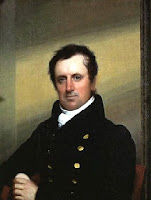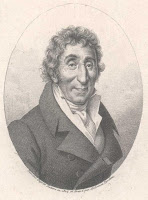
Saturday, July 26, 2008
from Voyage dans la Belgique, la Hollande et l'Italie... par André Thouin, 1841

from Travels Through the Low Countries by John Ray, 1738
from Reminiscences of an English Cadet in the Austrian Service 1848-c 1854
We groped our way cautiously along several damp, dark passages, always descending somewhat, until at length we became aware that we were under the stage, for at a distance we could see a light, and a pair of legs, which we felt sure belonged to the prompter, while above we heard the crash of music and the applause of the audience. They were performing the opera of Robert Devereux. Just then I stumbled, and came with a dreadful clanking of sword and spur to the ground. We stood silently for a little, but by the profound quiet around us, and the sound of the singers' voices, and the answering murmur of the spectators, we concluded that we wore alone in this subterranean region. " Stay, Engländer," said my friend. " I know exactly where we are now, and there is a passage by which we could enter the pit easily if only the attention of every one could be diverted for the moment. An idea comes to mo, which we will quickly execute. Draw thy sword, and follow me softly." We proceeded cautiously until we arrived at the aforesaid pair of legs, on each side of -which we arranged ourselves; then my friend pricked the leg nearest to him gently with his sword point, which produced from above a curious yell, not at all in harmony with the music. I caught a glimpse of an arm descending on the opposite side, and to counteract the movement, I also, with the utmost delicacy, pricked the leg next to me. This caused another screech, and a tremendous scuffling, as of many feet rushing to and fro over the boards.
Now or never, we thought, and immediately applied our swords' points to both legs at the same instant. The prompter uttered an unearthly scream, greatly resembling that of a wild cat ; the legs flew upwards, out of the reach of our persecution ; the tumult above redoubled ; and we hastily decamped, ran along one of the little passages which communicated with the boxes, with which my friend was acquainted, and having entered perfectly unnoticed, we walked with an innocent and unconcerned air to the place reserved for the officers. We could not help being diverted with the scene which presented itself. The whole theatre was in a state of excitement and uproar, such as only those who know the easily-moved, impetuous, effervescent nature of the Italians, can understand. The orchestra was dumb; at least half of the people from the pit and lower boxes had leapt upon the stage ; the actors, every employé about the place, and all the ladies of the corps de ballet, in full costume, had likewise rushed thither. In the middle of them the prompter was hopping about, with both his hands applied to the calves of his legs ; every one was gesticulating, shouting, and asking what was the matter. Some imagined the man was attacked by a sudden fit of madness and would have laid violent hands on him, and to elude their kindly grasp he crouched, dived, and darted here and there in the oddest conceivable way, screaming out as he did so that il diavolo was below, and calling on all the saints to help and aid him. When comparative calm was restored a rigid search was made below, but, of course, nothing was discovered ; his legs were stripped and carefully examined in the presence of the gendarmes, but as there were neither wounds nor blood, and only one little scratch, which, I beg to say. was not on the leg which fate had given into my care, the assault was generally supposed to have been made by some playful kitten which had endeavoured to ascend to the upper regions by using the prompter's legs for a ladder, and no further inquiry was made. That night we supped joyously with our brother officers, but mindful of the consequences which we had formerly sustained by babbling tongues, we kept our little adventure rigidly to ourselves, and long before break of dawn we were on our horses, riding hard to reach Cremona before morning parade.
from Voyage de François Vinchant en France et en Italie, du 16 septembre 1609 au 18 février 1610
Thursday, July 24, 2008
from Viaje a Italia de Leandro Fernandez de Moratin, 1795
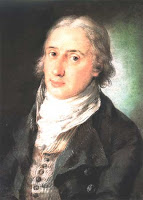
from Pájinas de mi diario durante tres años de viajes de Benjamín Vicuña Mackenna, 1854

from De Madrid a Nápoles ... de Pedro Antonio de Alarcón, 1860
Sunday, July 20, 2008
from New Italian sketches by John Addington Symonds, 1884
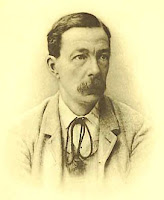
contrast of their color.
The time to see this square is in evening twilight--that wonderful hour after sunset--when the people are strolling on the pavement, polished to a mirror by the pacing of successive centuries, and when the cavalry soldiers group themselves at the angles under the lamp-posts or beneath
the dimly lighted Gothic arches of the palace. This is the magical mellow hour to be sought by lovers of the picturesque in all the towns of Italy, the hour which, by its tender blendings of sallow western lights with glimmering lamps, casts the veil of half-shadow over any crudeness and restores the injuries of time; the hour when all the tints of these old buildings are intensified, etherealized, and harmonized by one pervasive glow. When I last saw Piacenza, it had been raining all day; and ere sun-down a clearing had come from the Alps, followed by fresh threatenings of thunderstorms. The air was very liquid. There was a tract of yellow sunset sky to westward, a faint new moon half swathed in mist above, and over all the north a huge towered thunder-cloud kept flashing distant lightnings. The pallid primrose of the West, forced down and reflected back from the vast bank of tempest, gave unearthly beauty to the hues of church and palace--tender half-tones of violet and russet paling into grays and yellows on what in daylight seemed but dull red brick. Even the uncompromising facade of St. Francesco helped; and the dukes were like statues of the "Gran Commendatore," waiting for Don Giovanni's invitation.
from After Waterloo, Reminiscences of European Travel 1815-1819 by major William Edward Frye
Piacenza is a large handsome city; among the females that I saw in the streets the Spanish costume seems very prevalent, no doubt from being so long governed by a Spanish family.
from The Path to Rome by Hilaire Belloc, 1902
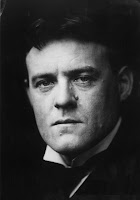
He was a good man, the innkeeper of this palace. He warmed me at his fire in his enormous kitchen, and I drank Malaga to the health of the cooks. I ate of their food, I bought a bottle of a new kind of sweet wine called 'Vino Dolce', and--I took the road.
LECTOR. And did you see nothing of Piacenza?
AUCTOR. Nothing, Lector; it was raining, and there was mud. I stood in front of the cathedral on my way out, and watched it rain. It rained all along the broad and splendid Emilian Way.
from Journal du voyage de Michel de Montaigne en Italie ... par Michel de Montaigne, 1580/1581
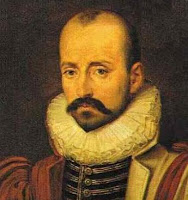
from Voyage historique, chorographique et philosophique ... par Philippe Petit-Radel, 1811/1812

from Letters from Italy, in the Years 1754 and 1755 by John Boyle 5th earl of Corke and Orrery

from a letter of Thomas Gray To His Mother, Bologna, Dec. 9, N.S. 1739
Saturday, July 19, 2008
Extracts from the Journals and Correspondence of Miss Berry from the Year ... - by Mary Berry (1783), 1866

from Italy in transition: public scenes and private opinions in 1860 by William Arthur ,1860
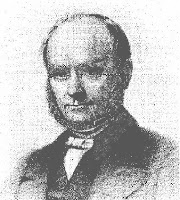
For a long time the lamps at the gate of
Wednesday, July 16, 2008
from Voyage pittoresque en Italie: partie septentrionale par Paul de Musset, 1855

Tuesday, July 15, 2008
from Pictures from Italy ... By Charles Dickens, 1846

from A Ride on Horseback to Florence Through France and Switzerland by Augusta Macgregor Holmes - october 1842
At last, Piacenza was in sight; the dark red city rising on the broad plain beyond the broad Po, with the stone arch, the relic of a Roman bridge, standing in its centre, on the deposit of sand and stones; and the two bridges of boats which we were to cross, and which should be a relic also, being extremely unsafe, the boats small, and the decaying planks they sustain a succession of hill and dale, over which our horses feared to advance. The toll is five sous per steed, which, considering its state, is sufficient.
Having ridden in safety, but some dread, across this uneven and trembling bridge, we left our passport at the gate, and the douaniers came smilingly forward. "What is in this valise ?" "Linen." "And in this ?" "Linen also; will you look at it ?" The douanier smiled, and shook his head, but made an almost imperceptible sign of thirst, and D--- gave a silver coin to satisfy it. There is a frankness about this conduct which is exceedingly agreeable. One is sure of giving in the right place, and without offence, and also of saving trouble at small cost, for it happened that the only change we possessed was an Austrian lira, which translated, means seventeen sous, three centimes; and though we were almost ashamed to offer it, it seemed to content the custom-house officer perfectly.
The sombre streets of this saddest of towns led us to San Marco, an inn neither good nor bad, though certainly better than its Milan namesake, and having fine rooms and broad staircase, which common cleanliness would make objects of admiration. Our sleeping chamber with its dome is of such elegant form that I should like to transport it afar, but spoiled with gaudy frescoes on wall and ceiling, by dirty floor, and ragged furniture. The eating room, a noble hall, with a range of pillars down its centre, and hung round with paintings for sale - some few good, several curious; luxury and poverty, dirt and elegance, everywhere blended - even in the yard, which is an abomination, yet where a coved trellis-work forms a roof which a splendid vine covers with its thick leaves, making the lovliest of ceilings.
We walked to the cathedral - a dark red heavy building, built almost entirely of brick... The church is large without being handsome... We were driven from the cathedral by two or three guides, who, next to beggars, persecute strangers in Italy, following with a pertinacity which defies repulse, forcing on you a new version of history, and concluding each sentence by saying, with extended hand, "Le sue buone grazie." ... On the whole, though we made the tour of all the other churches we found open, and wandered till we were weary among the desolate streets, the day we passed at
Tuesday, July 8, 2008
Monday, July 7, 2008
from Excursions in Italy By James Fenimore Cooper, 1838
